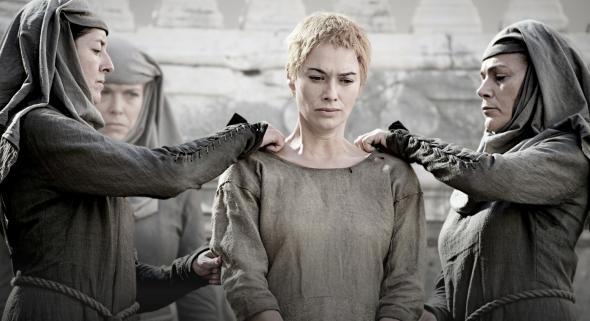Much of Sunday night’s season finale of Game of Thrones was hard to watch, but amid all the violence and despair, perhaps the most troubling image was that of a naked female body. The show is notorious for sprinkling the screen with female nudity purely for the sake of titillation (show director Neil Marshall even suggested that HBO executives aggressively push directors for a higher boob quotient onscreen). But there was nothing exciting about seeing Cersei Lannister stripped down naked and marched through a jeering crowd on the streets of King’s Landing while a septa yelled “Shame, shame” over her head.
Cersei’s walk of shame capped off a season that inspired controversy over sexual violence on the show—but it also demonstrated why the critics were so off the mark. More than any other in the show’s history, this season showed the writers’ deep understanding of sexual violence: that it’s not about titillation or sexual gratification, but about dominance.
Cersei has committed regicide, treason, and incest, but the offense for which she is marched through the streets naked is the simple crime of adultery. Which, as she points out, should hardly count when her husband, Robert, went “whoring every chance he could.” Cersei may be a bad person, but the fact that she’s punished so harshly for the most understandable thing she ever did—cheating on a wife-battering adulterer who scattered more than a dozen bastard children around town—exposes the misogynist intentions of the High Sparrow who sentences her. That they cut off her hair, which my colleague Amanda Hess notes was a female-specific bit of medieval sexual humiliation, makes the double standard all the harder to deny. By the time she is done with her walk, even the most hardened Cersei hater is raging not at her, but at the hypocrites and religious fanatics who have put her through this.
It may startle some to read that Game of Thrones nailed this scene. The show hasn’t been the best in the past when it comes to sexual abuse and violence, most notoriously in a scene that viewers clearly saw as rape but, for some reason, the director seemed to think was just a particularly over-the-top sex scene.
But this season marked a dramatic shift, suggesting that the Game of Thrones braintrust really has been listening to the critics. The most fiercely debated rape scene on the show, when Ramsey Bolton attacks Sansa Stark, is also one of the most clearly defined in terms of motivations. Sansa is clearly prepared to have consensual (if reluctant) sex with Ramsey, but he decides to rape her anyway. It has nothing to do with sexual desire, but just a sheer desire to dominate and destroy her.
More reasonable criticisms came up about a scene in which some Night’s Watchmen attempt to rape Gilly, but even then, the actual assault was rooted in this understanding that rape is about power, not sex. All season long, writers were seeding the idea that the Night’s Watchmen reject Jon’s attempts to make peace with wildlings, and this assault was part of that—a way to signal that any wildling left unprotected for a moment was subject to violent assault. It wasn’t about an overabundance of lust, but an overabundance of hatred for Gilly simply for being born on the wrong side of the Wall.
It’s a shame to see so many well-meaning critics and feminist writers decide that this is the season when the show went too far, at the very moment when Game of Throne’s writers finally have meaningful things to say about how sexual abuse and humiliation actually works in the world. Every terrible instance of sexual abuse in this season has a real-world analogue: The attack on Gilly felt very much like a hate crime, while Cersei’s forced march evokes the kind of ritualistic shaming—including forcible hair-cutting—that has re-emerged in the era of social media. A show with dragons and magical forest people has important things to say about the realities of sexual violence.
